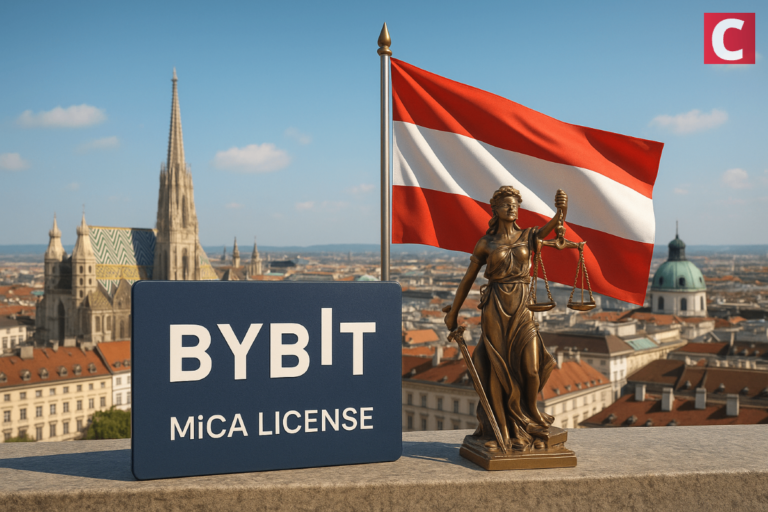Bybit has received a MiCA license from Austria’s Financial Market Authority, signaling a major step forward in the exchange’s European expansion.
Cryptocurrency exchange Bybit has obtained a Market in Crypto Asset (MiCA) license from Austrian regulators. This marks a major compliance with the regulatory framework in the European Union and a massive expansion for the firm in the region.
Bybit Establishes Office in Vienna
The Financial Market Authority (FMA) in Austria approved a MiCA license for Bybit, offering the exchange the opportunity to expand its operations in the EU. Registered under commercial number 636180i, Bybit EU is now legally approved to operate as a regulated Crypto Asset Service Provider (CASP) in the European market.
— Bybit (@Bybit_Official) May 29, 2025
This license also allows the exchange to extend its services across all 29 European Economic Area member states. Under this harmonized MiCA regulatory framework, Bybit can serve up to 500 million Europeans.
In addition to establishing its European headquarters in Vienna, Bybit, which previously experienced a major Ethereum theft, plans to hire up to 100 employees in the city to strengthen its local operations. These team members will help facilitate the rollout of crypto services tailored to the EU’s regulatory landscape.
As part of its broader mission, the company also aims to promote industry growth through its Blockchain for Good Alliance (BGA) initiative. To support this, Bybit is actively working to build partnerships with universities across Europe, fostering collaboration and innovation at the academic level.
“We’re proud to contribute to Austria’s forward-looking financial environment by investing in talent and innovation,” Mazurka Zeng, CEO of Bybit Europe, said.
Ben Zhou, the co-founder and CEO of Bybit, claimed that the license reflects the exchange’s commitment to a compliance-first approach. He further stated that the crypto exchange consistently collaborates with regulators and pursues licenses globally.
In the long run, the goal is to make sure its users can access its “innovative platform with the highest levels of regulatory and compliance assurance.”
MiCA Licenses in the Hands of Crypto Exchanges
It is worth noting that the MiCA regulatory framework came into effect this year, just before Donald Trump became president of the United States. In the last five months, several crypto exchanges have secured licenses in different EU countries to facilitate continued operations.
OKX received a full MiCA license in February, allowing it to “passport” its services across all 28 European Economic Area (EEA) member states.
This came a few weeks after the exchange received a MiCA pre-authorization license in January. With the full license, crypto traders in the EU states are now allowed to buy and sell digital assets like Bitcoin BTC $64 529 24h volatility: 4.6% Market cap: $1.29 T Vol. 24h: $40.29 B , Ethereum ETH $1 880 24h volatility: 7.5% Market cap: $227.64 B Vol. 24h: $19.46 B , Solana SOL $80.01 24h volatility: 8.1% Market cap: $45.62 B Vol. 24h: $3.96 B , and Ripple-associated XRP XRP $1.34 24h volatility: 5.0% Market cap: $81.80 B Vol. 24h: $3.26 B directly on OKX.
eToro, the commission-free social trading platform, also secured a license from the Cyprus Securities and Exchange Commission (CySEC). The exchange bagged this under the newly established Markets in Crypto Assets Regulation (MiCA) framework.
Beyond the MiCA license, Bybit received initial approval from the UAE’s Securities and Commodities Authority (SCA) in February. This license allows it to operate as a virtual asset platform operator in the country. Generally, the exchange plans to comply with global rules, including anti-money laundering (AML) and counter-terrorism financing (CFT) measures.
next